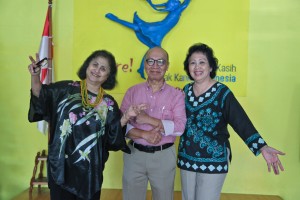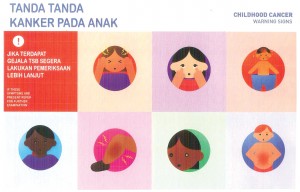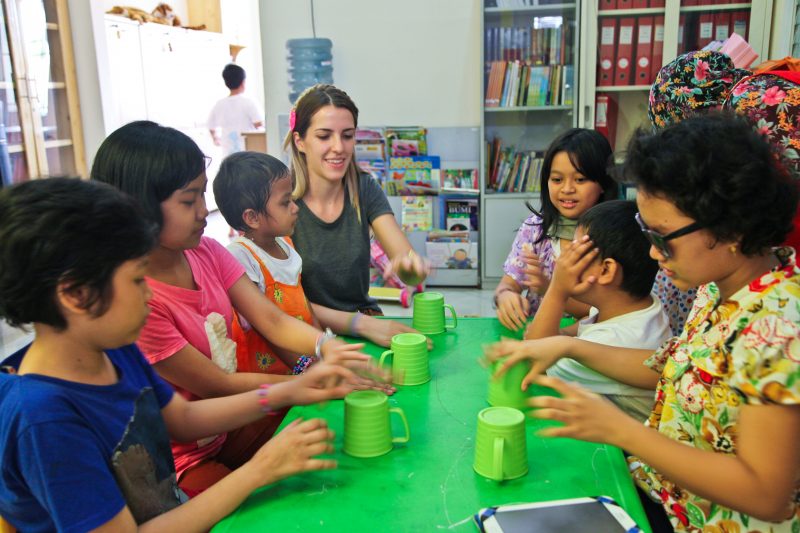Helping a sick child fight their illness takes a big enough emotional toll on a family. Adding a financial strain can make it all almost too much to bear.
According to the International Confederation of Childhood Cancer Parent Organizations (ICCCPO), in every one million children, 120 will get cancer. The introduction of Indonesia’s free healthcare system in 2014, Badan Penyelenggara Jaminan Sosial (BPJS), has encouraged many low-income families to seek professional treatment, which is helping to improve the early detection of cancer in children. Families come from provinces all over Indonesia for treatment in the main cancer hospitals, like Rumah Sakit Dr. Cipto Mangunkusumo (RSCM), which can last from months to years, incurring high additional costs during these times, for rent, food, and transportation. This makes staying for the entire duration of treatment difficult, if not impossible.
Yayasan Kasih Anak Kanker Indonesia (YKAKI) provides a solution for children with cancer from low-income families undergoing treatment in seven of Indonesia’s major cities: Jakarta, Surabaya, Bandung, Manado, Makassar, Jogjakarta and Denpasar. Together with their parents, these children are helped through extremely difficult times by being given shelter—a home away from home—full of sharing, love and kindness, without financial burden.
Established in 2006, this charity ensures that a child with cancer can stay at Rumah Kita (translates to ‘our house’) for as long as necessary with one guardian, complete with nourishing food, games and activities, friends, and an atmosphere of hope and positivity. YKAKI has come leaps and bounds from its humble beginnings, which was born from a sad tale of personal loss of co-founder Ira Soelystio.
Ira experienced cancer first-hand, beginning in 1984 when her son was diagnosed. She took her son for treatment in the Netherlands, and stayed at the Ronald McDonald House Charity for nearly one year. “It wasn’t easy as I had to be far away from my family and away from my youngest child. It was after my son passed away in 2004 that myself and my best friend Aniza Mardi Santosa decided to start YKAKI to help other children and parents in the same situation here in Indonesia,” Ira tells me as I visit Rumah Kita in Central Jakarta.
 The first ‘home’ was located in a small alley in Jakarta, capable of housing only five families, which was not easy to fill in its early days. To get patients into their home, Ira and Aniza (often referred to as Tom and Jerry due to their closeness and antics) visited RSCM and informed parents of children with cancer of their services, receiving sceptical responses from families, dubious of a free place to stay.
The first ‘home’ was located in a small alley in Jakarta, capable of housing only five families, which was not easy to fill in its early days. To get patients into their home, Ira and Aniza (often referred to as Tom and Jerry due to their closeness and antics) visited RSCM and informed parents of children with cancer of their services, receiving sceptical responses from families, dubious of a free place to stay.
“If you give something free, people are often suspicious,” Ira explains. “In the end, there were two families from Ternate and Lombok who had nowhere to go and ended up staying with us. Our services spread through word of mouth from there.”
As Ira showed me photos of children from the very first Rumah Kita, she sadly informed me that most of them had passed away. “This boy here, Akhbar, would always sing with a very loud voice and I’ll always remember him,” she explains as we looked at photographs. “At that time, around 70% of patients we encountered passed away, mostly because they came at too late a stage for effective treatment.”
Today, the mortality rate has dropped to 30% due to increased awareness of the disease and because of BPJS, which has encouraged more people to seek professional treatment.
Admission is simple: if a child is diagnosed by a doctor and referred to RSCM, they can come to Rumah Kita Jakarta. YKAKI will arrange for a pick-up via taxi, bringing the child and guardian to Rumah Kita, which will become their new home for as long as required. Transport to and from the hospital for treatment is always by taxi, which is provided by one of their sponsors.
“Families come in and out, alternating from treatment at the hospital to recovery time at Rumah Kita, which means the flow is steady here. We have a capacity of 28 families, and today we have 29 staying with us,” Ira says.
One of the toughest challenges Ira and Aniza face is when parents of a child give up and take them home before the end of treatment, which oftentimes results in relapse. YKAKI tries to encourage all families who stay at Rumah Kita not to return home until treatment is finished. Even if a child is only suspected of having cancer and are waiting for results, they are welcome to stay at Rumah Kita until diagnosis is given.
Today YKAKI are focusing on public awareness, not only to the community, but to doctors as well. From their experience, most parents have visited a puskesmas (health clinic) to receive a diagnosis for their child, going back and forth for several months before the doctor can give one. Because of this, YKAKI provide information leaflets to clinics in every province with detection signs to try and speed up the diagnosis.
 Parents at Rumah Kita have a good relationship with each other, sharing in fears, experiences and motivation to continue, no matter what. Parents who stay at Rumah Kita share chores like cooking, washing up and laundry. Routine visits from child cancer doctors help to educate parents, giving them power. Children continue formal education as they would at home and engage in music, games and fun activities together, keeping the morale high and positive energy flowing.
Parents at Rumah Kita have a good relationship with each other, sharing in fears, experiences and motivation to continue, no matter what. Parents who stay at Rumah Kita share chores like cooking, washing up and laundry. Routine visits from child cancer doctors help to educate parents, giving them power. Children continue formal education as they would at home and engage in music, games and fun activities together, keeping the morale high and positive energy flowing.
In total, around 600 families have stayed at Rumah Kita since 2006 and each have their own story to tell. Ira recounts a child who once stayed with them. “This particular child was extremely positive and refused to give up, although the doctor already had. The mother asked me what do to and I explained that children will always look to their parents – if you cry, your child will be sad, if you look positive, your child will feel positive, too. One day they were taking photographs and asked the child to be in one for kenang-kenangan (memories), to which the child asked if that meant he was going to die. This shocked everyone, showing what effect mere words can have on a child fighting cancer. The child underwent an operation and never lost hope throughout his four years here, where he still lives today.”
At Rumah Kita, children are playing and laughing, adults are busy preparing dinner or engaging in activities with their children, without the worry of financial burdens. It’s a place that gives a healing energy, a place where kids can just be kids, which is what they really need. One child enthusiastically told me, “Saya yakin bisa sembuh (I am sure I will get better),” followed by a big smile.
—
To volunteer teaching children at YKAKI’s Sekolah Ku, send your CV and information via email, including your hobbies and your availability to info@ykaki.org. YKAKI look for volunteers who can commit to a minimum period of one month.
YKAKI accepts donations. Please transfer to:
Yayasan Kasih Anak Kanker Indonesia
Bank BCA (Cinere Branch)
Account number: 267 300 9174
Swift code: CENAIDJA
YKAKI will hold a head-shaving fundraiser #BERANIGUNDUL on 15 February, 2015 at LOTTE Shopping Avenue, Jakarta and other YKAKI locations nationwide. Visit www.ykaki-indo.org or call +62 (0) 21 42872556 for more info.
www.ykaki-indo.org




